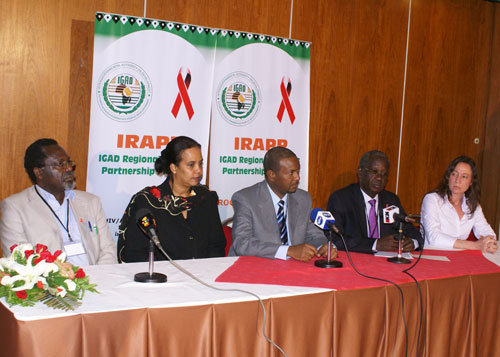 Nairobi, Kenya Monday 15th March 2010… Directors of National Aids Control Commissions from the six IGAD Member States are currently seating in Nairobi to review the regional program addressing the pandemic which is continuously affecting cross border mobile communities.
Nairobi, Kenya Monday 15th March 2010… Directors of National Aids Control Commissions from the six IGAD Member States are currently seating in Nairobi to review the regional program addressing the pandemic which is continuously affecting cross border mobile communities.
Their recommendations will be adopted by Ministers from the region, who will also address any emerging policy challenges under the auspices of the IGAD Regional HIV/AIDS Partnership Program, IRAPP. A regional policy framework is expected to harmonise prevention, treatment and care for mobile populations across the region that comprise, transport workers, migrants, mobile workers, refugees, internally displaced persons (IDPs), and others including nomadic pastoralists and fishing communities who move from one place to another temporarily, seasonally or semi-permanently. As a result, these populations often face a multitude of hardships that render them vulnerable to epidemics such as HIV/AIDS.
A few countries are already implementing bilateral mechanisms for the provision of HIV/AIDS prevention, treatment, care and support services along their common border points and areas identified as hotspots. “IRAPP project kicked off in March 2007 in Kampala, Uganda. Our meeting in Nairobi seeks to extend the best practices in the region to cross border mobile populations in Djibouti, Ethiopia, Kenya, Somalia, Sudan and Uganda”, notes Dr Osman Bilail, the Coordinator of the regional program.
IGAD Ministerial Committee comprises Ministers for Health and/or Ministers in charge of HIV&AIDS within the IGAD Member States. IGAD acknowledges the strong commitment to improving health and promoting the well-being of people in the region by governments, communities and development partners, to achieve the Millennium Development Goals and universal access to HIV/AIDS prevention, treatment, and care and support services
The meeting was attended by delegates from Ethiopia, Sudan, Djibouti, Kenya, Uganda and Somalia. It was also attended by representatives from the development partners including the World Bank, Canadian International Development Agency, United Nations High Commission for Refugees, United Nations Fund for Population Activities and Roll-Back-Malaria Campaign.
“IGAD through the program is committed to mobilizing and maintaining political will at the highest level of each country in support of common regional policies and strategies to prevent and control HIV and AIDS and other health related issues”, states Eng Mahboub Maalim, the Executive Secretary of the regional organization for the Horn of Africa.
The region represents one of the largest, most complex political, social and economic environments on the continent where population mobility and migration are thought to be key factors that bear on HIV prevalence and incidence rates.
Launched in 2007, the IGAD Regional HIV and AIDS Partnership Program (IRAPP) assists the Member States in the region to address the regional challenges of HIV/AID pandemic, in particular focussing on the vulnerable groups in the cross border areas.
“Countries in the Horn of Africa are at different stages of addressing the epidemic. The movement of vulnerable populations is a major challenge, requiring programs that specifically target the cross border mobile populations in a comprehensive and collaborative manner”, said Eng Mahboub.
The IRAPP mission is to reduce HIV infection and mitigate the socio-economic impact of the epidemic among cross border mobile populations in the IGAD region by increasing preventive action against HIV/AIDS and reducing misconceptions of cross border mobile populations, refugees, Internally Displaced Persons (IDPs), returnees and surrounding host communities concerning HIV/AIDS prevention, treatment and mitigation in selected sites in the IGAD Member States.
The project supports cross border collaboration on the health-sector response to HIV/AIDS; and strengthens IGAD’s and the countries’ capacity to coordinate a regional response to HIV/AIDS in the region. The project complements national programs which do not adequately address the vulnerable cross border mobile populations.
Related Article
Declaration By IGAD Ministerial Committee on Health, HIV and AIDS
